上海牛津版高一英语下册U2教案
英语高一牛津版moduleⅱunit2实用新教案05
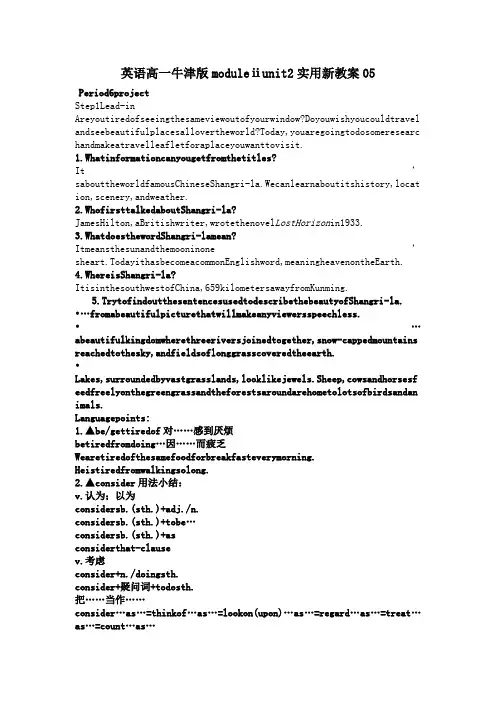
英语高一牛津版moduleⅱunit2实用新教案05Period6projectStep1Lead-inAreyoutiredofseeingthesameviewoutofyourwindow?Doyouwishyoucouldtravel andseebeautifulplacesallovertheworld?Today,youaregoingtodosomeresearc handmakeatravelleafletforaplaceyouwanttovisit.1.Whatinformationcanyougetfromthetitles?It’sabouttheworldfamousChineseShangri-la.Wecanlearnaboutitshistory,locat ion,scenery,andweather.2.WhofirsttalkedaboutShangri-la?JamesHilton,aBritishwriter,wrotethenovel LostHorizon in1933.3.WhatdoesthewordShangri-lamean?Itmeansthesunandthemooninone’sheart.TodayithasbecomeacommonEnglishword,meaningheavenontheEarth. 4.WhereisShangri-la?ItisinthesouthwestofChina,659kilometersawayfromKunming.5.TrytofindoutthesentencesusedtodescribethebeautyofShangri-la.•…fromabeautifulpicturethatwillmakeanyviewersspeechless.•…abeautifulkingdomwherethreeriversjoinedtogether,snow-cappedmountains reachedtothesky,andfieldsoflonggrasscoveredtheearth.•Lakes,surroundedbyvastgrasslands,looklikejewels.Sheep,cowsandhorsesf eedfreelyonthegreengrassandtheforestsaroundarehometolotsofbirdsandan imals.Languagepoints:1.▲be/gettiredof对……感到厌烦betiredfromdoing…因……而疲乏Wearetiredofthesamefoodforbreakfasteverymorning. Heistiredfromwalkingsolong.2.▲consider用法小结:v.认为;以为considersb.(sth.)+adj./n.considersb.(sth.)+tobe…considersb.(sth.)+asconsiderthat-clausev.考虑consider+n./doingsth.consider+疑问词+todosth.把……当作……consider…as…=thinkof…as…=lookon(upon)…as…=regard…as…=treat…as…=count…as…他考虑到北京大学进修. HeconsideredstudyingfurtherinBeijingUniversity.他被认为是做这工作最合适的人选. Heisconsideredtobethebestpersonforthejob.你有没有考虑过如何解决这问题. Haveyouconsideredhowtosolvethisproblem?3.join与…交接或汇合,连接Wecametotheplacewherethestreamjoinstheriver.我们来到了小溪与河流的汇合之处. Wheredothetworiversjointogether?这两条河流在哪里汇合?Thetwotownsarejoinedbyarailway.4.reach到达,延伸,伸出手reachaconclusion得出一个结论reachanagreement达成一致意见reachedtheirdestination.到达他们的目的地Haveyoureachtheendofthebook?Thenewsreachedmeyesterday.Hehasreachedtheageof50. Areyoutallenoughtoreachtheappleonthetree?Ex:TranslationThegardenreachesdowntothelake.花园一直延伸到了河边. Ireachedoutmyhandforthebookontheshelf.我伸手去取书架上的书. Herhairwassolongthatitreachestoherwaist.她的头发特别长以至于延伸到腰间.withinone’sreachoutofone’sreach/beyondone’sreach5.publish1)出版;发行Thiscompanypublisheschildren'sbooks.那个公司出版儿童书籍。
英语高一牛津版moduleⅱunit2实用新教案
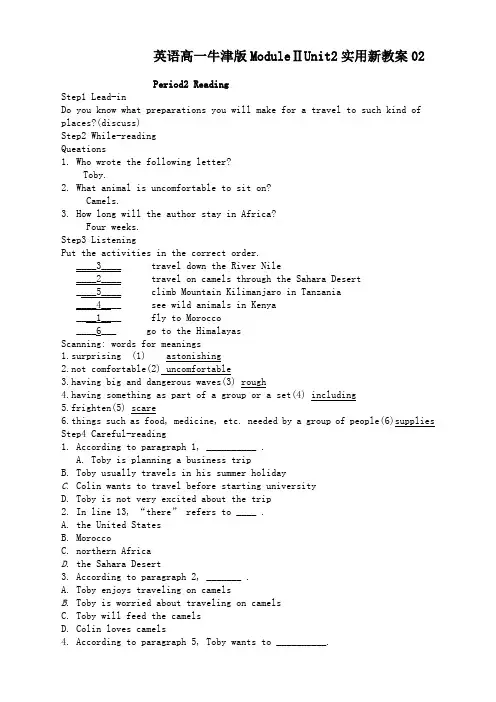
英语高一牛津版ModuleⅡUnit2实用新教案02Period2 ReadingStep1 Lead-inDo you know what preparations you will make for a travel to such kind of places?(discuss)Step2 While-readingQueations1. Who wrote the following letter?Toby.2. What animal is uncomfortable to sit on?Camels.3. How long will the author stay in Africa?Four weeks.Step3 ListeningPut the activities in the correct order.____3____ travel down the River Nile____2____ travel on camels through the Sahara Desert____5____ climb Mountain Kilimanjaro in Tanzania____4____ see wild animals in Kenya____1____ fly to Morocco____6___ go to the HimalayasScanning: words for meanings1.surprising (1) astonishing2.not comfortable(2) uncomfortable3.having big and dangerous waves(3) rough4.having something as part of a group or a set(4) including5.frighten(5) scare6.things such as food, medicine, etc. needed by a group of people(6)supplies Step4 Careful-reading1. According to paragraph 1, __________ .A. Toby is planning a business tripB. Toby usually travels in his summer holidayC. Colin wants to travel before starting universityD. Toby is not very excited about the trip2. In line 13, “there” refers to ____ .A. the United StatesB. MoroccoC. northern AfricaD. the Sahara Desert3. According to paragraph 2, _______ .A. Toby enjoys traveling on camelsB. Toby is worried about traveling on camelsC. Toby will feed the camelsD. Colin loves camels4. According to paragraph 5, Toby wants to __________.A. see a giraffe up closeB. scare animals awayC. take photographs of animalsD. shoot an elephant5. In line 36, “them” refers to _______.A. the elephantsB. Colin and TobyC. the guidesD. the giraffes6. According to the letter, Toby enjoys ___________ .A. comfortable, expensive holidaysB. cultural holidaysC. adventure holidaysD. staying at homeHow do you think a traveling is like?( use adjectives to describe it) Eg: astonishing ,rough, tiring, exciting, uncomfortable, scary, dangerous sick…Four weeks.Step3 ListeningPut the activities in the correct order.____3____ travel down the River Nile____2____ travel on camels through the Sahara Desert____5____ climb Mountain Kilimanjaro in Tanzania____4____ see wild animals in Kenya____1____ fly to Morocco____6___ go to the HimalayasScanning: words for meanings1.surprising (1) astonishing2.not comfortable(2) uncomfortable3.having big and dangerous waves(3) rough4.having something as part of a group or a set(4) including5.frighten(5) scare6.things such as food, medicine, etc. needed by a group of people(6)supplies Step4 Careful-reading1. According to paragraph 1, __________ .A. Toby is planning a business tripB. Toby usually travels in his summer holidayC. Colin wants to travel before starting universityD. Toby is not very excited about the trip2. In line 13, “there” refers to ____ .A. the United StatesB. MoroccoC. northern AfricaD. the Sahara Desert3. According to paragraph 2, _______ .A. Toby enjoys traveling on camelsB. Toby is worried about traveling on camelsC. Toby will feed the camelsD. Colin loves camels4. According to paragraph 5, Toby wants to __________.A. see a giraffe up closeB. scare animals awayC. take photographs of animalsD. shoot an elephant5. In line 36, “them” refers to _______.A. the elephantsB. Colin and TobyC. the guidesD. the giraffes6. According to the letter, Toby enjoys ___________ .A. comfortable, expensive holidaysB. cultural holidaysC. adventure holidaysD. staying at homeHow do you think a traveling is like?( use adjectives to describe it) Eg: astonishing ,rough, tiring, exciting, uncomfortable, scary, dangerous sick…。
牛津版高一英语下册unit-2教案2
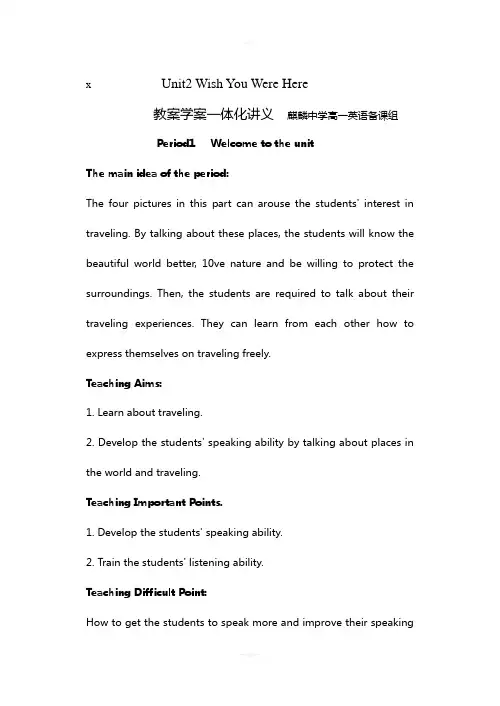
x Unit2 Wish You Were Here教案学案一体化讲义麒麟中学高一英语备课组Period1 Welcome to the unitThe main idea of the period:The four pictures in this part can arouse the students' interest in traveling. By talking about these places, the students will know the beautiful world better, 10ve nature and be willing to protect the surroundings. Then, the students are required to talk about their traveling experiences. They can learn from each other how to express themselves on traveling freely.Teaching Aims:1. Learn about traveling.2. Develop the students' speaking ability by talking about places in the world and traveling.Teaching Important Points.1. Develop the students' speaking ability.2. Train the students' listening ability.Teaching Difficult Point:How to get the students to speak more and improve their speakingability.Teaching Methods:1. Free talk to arouse the students' interest in traveling.2. Listening-and-answering activity to help the students to go through the listening material.3. Discussion to make the students finish the task of speaking.Step 1 Lead-inNowadays, more and more people are interested in traveling on holidays. They want to go to different places and different countries to get close to nature to enjoy beautiful scenery. Now, I have some questions to ask you.1. How do you spend your holidays?2. What do you usually do on your holidays?3. Is there anywhere you would particularly like to visit on holidays? Where and Why?( give the students5 minutes to think them over or discuss them.) Step 2 Welcome to the unitT: Now, let’s come to the pictures. First, please describe the four pictures.Picture 1. Africa is a continent rich in natural resources, oil, gold, diamonds and countless other minerals. A large variety of animals like elephants, lions, zebras and giraffes live in this mysterious and wild land. Being the second largest continent on the Earth, it contains more countries than any other. Each has unique customs and natural attractions. The grasslands of Africa are home to various animals. Lions are the only cats that live in large family groups. Elephants usually live in groups that consist of 8 to 15 related members. Zebras, with a horse-like appearance, have wide black-and-white stripes all over their bodies. Giraffes in Africa can grow to a height of over 17 feet.Picture2. Australia’s Gold Coast is famous for its attractive beaches. With 70 kilometers of coastline, Gold Coast beaches have something for everyone. Every year the Gold Coast attracts visitors from all over world to sit back, relax, experience the fun and taste the excitement of Australia’s most popular holiday playground.Picture 3 The Amazon rainforest extends for 4 million sq km and is home to hundreds of thousands of animals and plant species. Although it covers only 3.5% of the overall Earth’s surface, it ishome to around 50% of the world’s living species, many of which are still unknown to humans.Picture 4 Where i s the Gobi Desert?What is it like?Have you ever heard of a person who traveledacross the Gobi Desert allby himself/herself?Step3 Language Points:1. There are a lot of amazing adventures to have and places to see in the world.amazing 令人惊奇的e.g The economy of that area is developing at an amazing speed. amazed 感到惊奇的be amazed at/bybe amazed to do sth.be amazed that…1. 他的丰富的知识使我们感到吃惊.( be amazed at/by)2. 当我10年后回到家乡,我惊奇地发现家乡已经发生了巨大的变化. (be amazed to do sth.)3. 你居然没去过上海,真让我吃惊.( be amazed that…)2. Explore the amazing Brazilian rainforest!explore vt. 勘探, 探索, 探究1. They explored the land to the south of the river.2. 对北冰洋的探索需要巨大的费用.It takes a large amount of money to explore the Artic Ocean. Ex: 美国科学家下个月即将探索月球.拓展: explorer n. 探险家exploration n. 探险, 探索Period2 ReadingStep1 Lead-inDo you know what preparations you will make for a travel to such kind of places?(discuss)Step2 While-readingQueations1. Who wrote the following letter?Toby.2. What animal is uncomfortable to sit on?Camels.3. How long will the author stay in Africa?Four weeks.Step3 ListeningPut the activities in the correct order.____3____ travel down the River Nile____2____ travel on camels through the Sahara Desert____5____ climb Mountain Kilimanjaro in Tanzania____4____ see wild animals in Kenya____1____ fly to Morocco____6___ go to the HimalayasScanning: words for meanings1.surprising (1) astonishing2.not comfortable(2) uncomfortable3.having big and dangerous waves(3) rough4.having something as part of a group or a set(4) including5.frighten(5) scare6.things such as food, medicine, etc. needed by a group of people(6)suppliesStep4 Careful-reading1.According to paragraph 1, __________ .A. T oby is planning a business tripB. Toby usually travels in his summer holidayC. Colin wants to travel before starting universityD. T oby is not very excited about the trip2. In line 13, “there” refers to ____ .A. the United StatesB. MoroccoC. northern AfricaD. the Sahara Desert3. According to paragraph 2, _______ .A. T oby enjoys traveling on camelsB. T oby is worried about traveling on camelsC. T oby will feed the camelsD. Colin loves camels4. According to paragraph 5, T oby wants to __________.A. see a giraffe up closeB. scare animals awayC. take photographs of animalsD. shoot an elephant5. In line 36, “them” refers to _______.A. the elephantsB. Colin and TobyC. the guidesD. the giraffes6. According to the letter, T oby enjoys ___________ .A. comfortable, expensive holidaysB. cultural holidaysC. adventure holidaysD. staying at homeStep5 Post-readingStep6 DiscussHow do you think a traveling is like?( use adjectives to describe it) Eg: astonishing ,rough, tiring, exciting, uncomfortable, scary, dangeroussick…Period3 ReadingLanguage points:1. wish you were herewish 之后的宾语从句要用虚拟语气,用过去时表示对现在的虚拟,用过完成时表示对过去的虚拟。
英语高一牛津版moduleⅱunit2实用新教案03
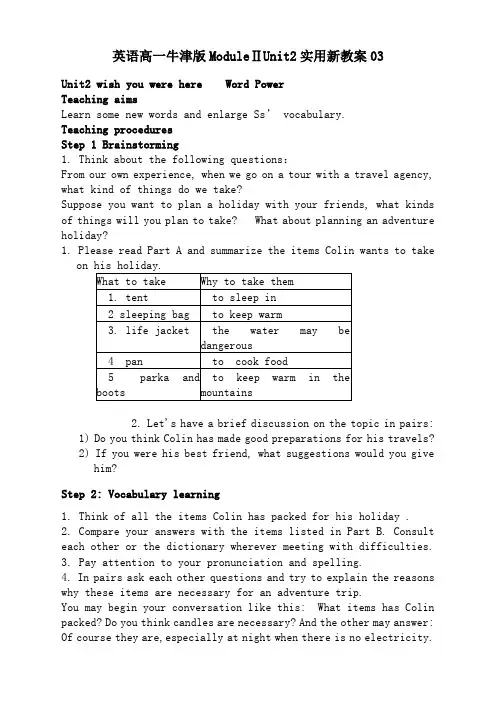
英语高一牛津版ModuleⅡUnit2实用新教案03Unit2 wish you were here Word PowerTeaching aimsLearn some new words and enlarge Ss’ vocabulary.Teaching proceduresStep 1 Brainstorming1. Think about the following questions:From our own experience, when we go on a tour with a travel agency, what kind of things do we take?Suppose you want to plan a holiday with your friends, what kinds of things will you plan to take? What about planning an adventure holiday?1. Please read Part A and summarize the items Colin wants to take2. Let's have a brief discussion on the topic in pairs:1) Do you think Colin has made good preparations for his travels?2) If you were his best friend, what suggestions would you givehim?Step 2: Vocabulary learning1. Think of all the items Colin has packed for his holiday .2. Compare your answers with the items listed in Part B. Consult each other or the dictionary wherever meeting with difficulties.3. Pay attention to your pronunciation and spelling.4. In pairs ask each other questions and try to explain the reasons why these items are necessary for an adventure trip.You may begin your conversation like this: What items has Colin packed? Do you think candles are necessary? And the other may answer: Of course they are,especially at night when there is no electricity.5. Please read the letter in Part C. Try to understand the letter first and then choose the proper words to make the letter meaningful. AnswersCStep 3: Vocabulary extension1. Let's discuss the following questions:Is Colin really well-equipped for the journey?Is he missing something very important?2. Read the instructions for Part D and try to complete the items individually. Consult each other or dictionaries before asking help from me.。
高一牛津英语第二模块第二单元(Module2Unit2)教案课件 全套M2,U2 reading1
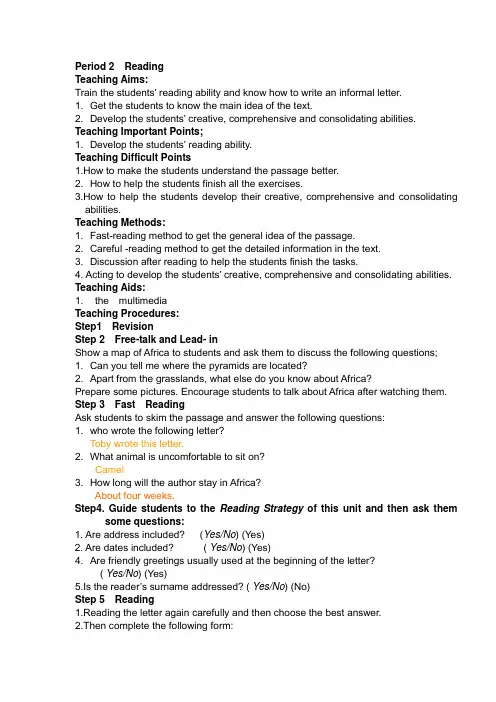
Period 2 ReadingTeaching Aims:Train the students’ reading ability and know how to write an informal letter.1. Get the students to know the main idea of the text.2. Develop the students’ creative, comprehensive and consolidating abilities. Teaching Important Points;1. Develop the students’ reading ability.Teaching Difficult Points1.How to make the students understand the passage better.2. How to help the students finish all the exercises.3.How to help the students develop their creative, comprehensive and consolidating abilities.Teaching Methods:1. Fast-reading method to get the general idea of the passage.2. Careful -reading method to get the detailed information in the text.3. Discussion after reading to help the students finish the tasks.4. Acting to develop the students’ creative, comprehensive and consolidating abilities. Teaching Aids:1. the multimediaTeaching Procedures:Step1 RevisionStep 2 Free-talk and Lead- inShow a map of Africa to students and ask them to discuss the following questions;1. Can you tell me where the pyramids are located?2. Apart from the grasslands, what else do you know about Africa?Prepare some pictures. Encourage students to talk about Africa after watching them. Step 3 Fast ReadingAsk students to skim the passage and answer the following questions:1. who wrote the following letter?Toby wrote this letter.2. What animal is uncomfortable to sit on?Camel3. How long will the author stay in Africa?About four weeks.Step4. Guide students to the Reading Strategy of this unit and then ask them some questions:1. Are address included? (Yes/No) (Yes)2. Are dates included? ( Yes/No) (Yes)4. Are friendly greetings usually used at the beginning of the letter?( Yes/No) (Yes)5.Is the reader’s surname addressed? ( Yes/No) (No)Step 5 Reading1.Reading the letter again carefully and then choose the best answer.2.Then complete the following form:Try to put the activities in the correct order:___3_______ travel down the River Nile___2______travel on camels through the Sahara Desert___5_______climb Mount Kilimanjaro in Tanzania___4_______see wild animals in Kenya___1_______fly to Morocco___6______ go to the HimalayasStep 7 VocabularyChoose the correct meanings for the words below. Write the letters in the blankson page 24.Step8 Discussion1. Which part of the world would you like to visit? Why?2. Adventures such as mountain climbing and whit-water rafting can be dangerous. Doyou think it is worth risking your life for adventures? Why or why not?。
上海理工大学附属中学高一英语牛津上海新世纪版下册Unit 2 Travel Around the World 教案
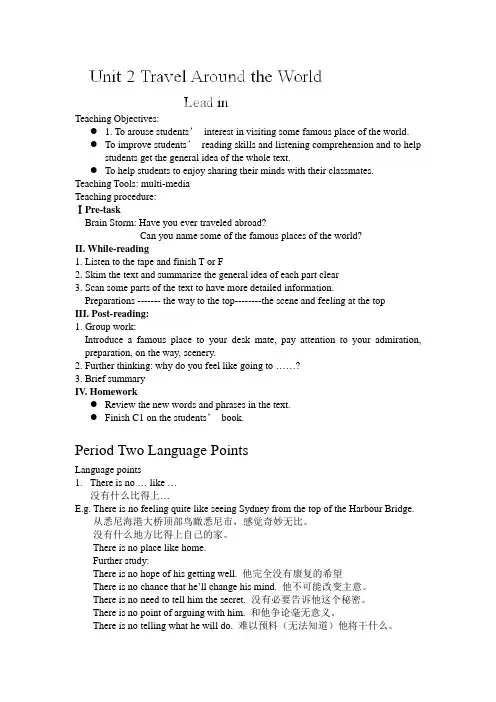
Teaching Objectives:● 1. To arouse students’interest in visiting some famous place of the world.●To improve students’reading skills and listening comprehension and to helpstudents get the general idea of the whole text.●To help students to enjoy sharing their minds with their classmates. Teaching Tools: multi-mediaTeaching procedure:ⅠPre-taskBrain Storm: Have you ever traveled abroad?Can you name some of the famous places of the world?II. While-reading1. Listen to the tape and finish T or F2. Skim the text and summarize the general idea of each part clear3. Scan some parts of the text to have more detailed information.Preparations ------- the way to the top--------the scene and feeling at the topIII. Post-reading:1. Group work:Introduce a famous place to your desk mate, pay attention to your admiration, preparation, on the way, scenery.2. Further thinking: why do you feel like going to ……?3. Brief summaryIV. Homework●Review the new words and phrases in the text.●Finish C1 on the students’book.Period Two Language PointsLanguage points1.There is no … like …没有什么比得上…E.g. There is no feeling quite like seeing Sydney from the top of the Harbour Bridge.从悉尼海港大桥顶部鸟瞰悉尼市,感觉奇妙无比。
英语高一牛津版moduleⅱunit2实用新教案3
英语高一牛津版ModuleⅡUnit2实用新教案3Period3 ReadingLanguage points:1. wish you were herewish 之后的宾语从句要用虚拟语气,用过去时表示对现在的虚拟,用过完成时表示对过去的虚拟。
“但愿,要是…就好了”hope/ wishI see you soon.Let’s the best.I I a bird.I she come tonight.My parents me to grow up quickly.I you a happy New Year!--- Do so.2. go trekking 长途跋涉e.g. go campinggo swimminggo skatinggo white-water raftinggo mountain climbinggo Internet surfing3. what animal is uncomfortable to sit on?这人很难相处。
The man is hard .这个题目对于我来说很容易解决。
The problem is easy for me .我需要一顶帐篷在里面睡觉。
I need a tent .给我一张纸写字。
Give me a piece of paper .有五双可供选择。
There are five pairs .4. adventure①U. 冒险C 冒险经历,奇遇充满惊险刺激的生活 a life full of adventure年轻人总喜欢冒险。
The young are always fond of .这位探险家跟孩子们讲了他的非洲奇遇。
The told the children about his in Africa.②vt. 大胆提出或进行,敢于大胆提出意见③vi. 冒险,企图侥幸(on/upon)Those explorers adventured on unknown seas.5. be busy (in) doing sth be busy at/with/over/about sth女孩忙着做家庭作业。
上海牛津版高一下册英语Unit2 Two geniusesgrammar教案S1B1
Chapter 2.Two Geniuses-Language一、章节分析(一)综述本章节的语法点----A 与名词连用的不定式,B wh-疑问词与不定式连用,C 反问疑问句。
A 部分要求学生记住这些与“to do”连用的词。
B部分要提示学生:需要一些动词的帮忙,“wh- to do”才能成行C部分使用于口语,所以更应强调其口头的实用性。
(二)目标掌握与不定式连用的那些名词;加强wh- to do的熟练程度;复习那些特殊的反意疑问句,提醒学生注意语调。
(三)教学方法口语情景教学法( 教师创设情景,学生主要通过口语训练达到对语言知识的掌握)(四)重点和难点A部分重点讲。
B部分简单总结。
C部分有选择性地讲。
When to use tag questionsWe use tag questions, Ahmad, to check information or to ask for agreement. If we use a rising intonation in the tag, we do not know or are not quite sure of the answer. If we use a falling intonation in the tag, we are seeking the agreement of the person we are talking to.We can reply to tag questions either with simple yes/no answers (negative tags normally expect a yes answer and positive tags normally expect a no answer) or by using yes/no + auxiliary verb.In these examples, use a rising intonation in the tag. It is a genuine question. You are not sure what the answer will be.You haven't seen my tennis shoes, have you? ~ No, I'm sorry. I haven't.I couldn't borrow yours by any chance, could I? ~ No. They wouldn't fit you.In these examples, use a falling intonation in the tag. You are simply seeking agreement.It's been a lovely day today, hasn't it? ~ Yes, it has. Gorgeous.It was a lovely wedding, wasn't it? ~ Wonderful!I thought Sue looking stunning in her wedding dress, didn't she? ~ Yes, she did. Absolutely stunning. It's a shame the day is over, isn't it? ~ Yes, it is.。
上海牛津版高一下册英语Unit2 Two geniusesreading教案 S1B
Chapter 2 Two Geniuses-Reading一、章节分析(Reading section )(一)综述本单元向我们讲述了发生在爱因斯坦身上真实的事情。
并不是我们想象中的大科学家治学的故事,而是他跟大家开了一场玩笑,反映出他幽默的一面。
1先确定Main characters? Setting? Time? Place?再理清storyline:Beginning? Development? Climax? Ending?这样也为之后的写作做好铺垫。
2可以利用文章中的图片预测故事,或让学生阅读到某一段停下,关上课本,对接下去的故事情节进行预测。
3可以引导学生讨论什么样的人算是天才。
天赋就等于成功么?也可以引导学生讨论生活或学习的方法。
是不是额外需要一份好奇心、想象、创造力、甚至幽默?(二)阅读目标1知识目标学习课文中重点词、词组、句型和语法。
2能力目标提高学生的阅读理解能力和培养学生的想象力。
了解故事体裁的必备要素。
3情感目标帮助学生对how to treat the genius you are born with?以及how to live a life?有一定的思考。
(三)教学方法任务型教学法组织教学。
(四)重点和难点1词汇学习1)核心词汇●applause●attempt●curiosity●eventually●genius●gift●lecture●modest●offer●remote●reputation2)拓展词汇●nuclear●theory●universe3)词组和短语●dozens of●have no/an idea…●be in trouble●join in●by heart●regard…as●lead to●let…down● a sense of humo(u)r●take over2 句型学习●so…that●(did), (did)…and (did)●would like to (do)●It’s a pleasure to (do)…●tag questions二、教学设计(Teaching Designs)two pictures?3.Who could be Albert Einstein?(a) (b)While-reading 梳理课文:●简单地介绍一下爱因斯坦。
牛津高一英语M2U2Welcometotheunit教案
Unit 2 Wish you were hereThe first periodWelcome to the unitTeaching Aims:1.Learn about traveling2. Develop students’ speaking ability by talking about places in the world and traveling. Teaching Important Point:Develop students’ speaking ability.Teaching Difficult Point:How to get students to speak more and improve their speaking ability.Teaching Methods:1. Free talk to arouse students’ interest in traveling.2. Discussion to make students finish the task of speaking.Teaching Aids:1. The multimedia2. The blackboardTeaching Procedures;Step 1 Greeting and Lead-in(Show the students some pictures on the screen)1. Do you like traveling?Do you want to visit these picturesque places?Why do you want to visit these places?Step 2 Welcome to the unit(Show the students 4 pictures of Africa, Australia, Brazil, and Gobi Desert)Which of these places would you like to visit most?And why?Step 3 Some questions about yourself1. Have you ever been to some places?2. What is the most exciting place you have ever been to?3. Try to describe the place for us.Step 4 Pair WorkBob just come back from Sydney, and now Susan is asking him about his trip.1.Work in pairs and try to use the following expressions.Useful expressions:• What do you think of the city?• How do you find the city?• Are there any places of historic interest to see in this city?• What is the city famous for?• Would you please tell me something about the historic art of the city?• I’d like to look around the city.• How I wis h I could go there someday!2. Act out your dialogue in front of the class.Step 5 Discussion-- talk about traveling(show the following on the screen)Bob likes traveling, but Jean thinks it too costly and she has a good idea about how to travel without paying too much.Step 6 Homework1. Find more information about places in the world and traveling.2. Preview the reading text.3. Unit Revision: P75: Period 1.。
- 1、下载文档前请自行甄别文档内容的完整性,平台不提供额外的编辑、内容补充、找答案等附加服务。
- 2、"仅部分预览"的文档,不可在线预览部分如存在完整性等问题,可反馈申请退款(可完整预览的文档不适用该条件!)。
- 3、如文档侵犯您的权益,请联系客服反馈,我们会尽快为您处理(人工客服工作时间:9:00-18:30)。
高一牛津版下册·学科辅导讲义学员编号: 年 级:高一 上课日期:学员姓名: 辅导科目:英语 学科教师:授课主题U2 Great minds 模 式1 V —— 类 型 □同步 □测试 得 分家长签字 问题统计: 知识梳理Anything in common?一、词汇Words1. genius n. (l) 天才人物Tests showed that the child was a genius.测试表明,这个孩子是个天才。
(2)对(做)某事物的天生的非凡才能The girl has a genius for language.这个女孩有语言的天赋。
2. attempt (l ) n.努力尝试His attempt is to learn to ski.他试图学习滑雪。
He failed in his attempt to win the first prize.他赢取第一名的尝试失败了。
(2 )v. 试图,尝试The prisoners attempted an escape, but failed.这个囚犯企图逃跑,但失败了。
3. universe n.宇宙One theory about the origin of the universe is that it began with a ‘Big Bang'.宇宙起源的理论之一是宇宙源于一次大爆炸。
4. nuclear adj.原子能的;核能的There are both good and bad aspects of nuclear energy.核能有利也有弊。
5. gift n.天赋;才能The composer is also a gifted pianist.这位作曲家也是位有才能的钢琴家。
GUESS :Do you know them? Can you tell me what their achievements are ?4. We are very much honoured to have a chance to study in this school.5. His lecture has aroused the audience's curiosity about human genes.6. When he saw people in trouble, he always offered his help.7. The bird spread its wings and flew away.8. The enemy's attempt to capture the city failed.9. She won Best Actress award at the Chicago International Film Festival.10. When Mr Brown left the company, the manager presented him with a gold watch.课后作业Ⅱ.Grammar and VocabularySection ADirections: Beneath each of the following sentences there are four choices marked A, B, C and D. Choose the one answer that best completes the sentence.1. The teacher, as well as his students, ______ interest in the indoor sports.A. isB. areC. showsD. show2. The car_______ the man _______is Albert Dean.A. is belonging to; his nameB. has belonged to; him nameC. is belonged to; whose nameD. belongs to; whose name3. _______he really means is that he doesn't agree with us.A. WhatB. ThatC. whyD. Whether4. When did the theatre_______fire?A. makeB. setC. burnD. catch5. He patted_______with a smile.A. my shoulderB. me on the shoulderC. my shoulder on meD. me by the shoulder6. The authorities banned visitors _______taking pictures with flash in the museum.A. ofB. fromC. withD. on7. My elder brother is_______to me by ten years.A. juniorB. superiorC. seniorD. inferior8. The weather in Britain disagrees_______me, for it is too foggy.A. toB. aboutC. onD. with9. Many applicants_______for the vacancy of HR manager.A. neededB. appliedC. answeredD. gave10. Jenny is a strange person and many people think it is hard to get along _______her.A. withB. toC. alongD. from11. Everyone wants to have a job with better_______.A. savingsB. moneyC. earningsD. pay12. All the employees are working hard to_______reputation for their company.A. produce a goodB. enjoy a highC. make a highD. win a good13. He left home at the age of 16 and has been away for_______years.A. dozens ofB. two dozensC. two dozens ofD. several dozens14. In the absence of water, fish _______long.A. would not liveB. must not liveC. were notD. not live15. The electric _______was cut off for two days due to a violent storm.and children are encouraged to be 5 at an early age. Some people believe that American parents carry this freedom 6 far. Others think that a strong father image would not 7 the American values of equality and independence, because America emphasizes the importance of independence. Young people are expected to 8 their parental families by the time they have 9 their late teens or early twenties. Indeed, not to do so is often regarded as a 10 ,,a kind of weak dependence.This pattern of independence often results in serious 11 for the aging parents of a small family. The average Americans are expected to live 12 the age of 70. The retirement age is 13 65. The children have left home, got married, and 14 their own households. At least 20 percent of all people over 65 do not have enough retirement incomes. 15 the major problem of many elderly couples is not economic. They feel useless and lonely with neither an occupation nor a close family group.1. A. senior B. junior C. old D. young2. A. watched B. followed C. understood D. grasped3. A. what B. that C. which D. when4. A. for B. on C. without D. in5. A. dependent B. independent C. sure D. secure6. A. too B. almost C. nearly D. so7. A. gain B. welcome C. suit D. estimate8. A. break up B. break into C. break through D.break away from9. A. reached B. come C. arrived D. developed10. A. reward B. criticism C. failure D. success11. A. events B. problems C. matters D. affairs12. A. on B. up C. from D. beyond13. A. only B. usually C. sometimes D. seldom14. A. set forth B. set aside G set up D. set down15. A. But B. Therefore C. In contrast D. On the other hand1—5 CBACB 6—10 ACDAC 11—15 BDBCASection BDirections: Read the following four passages. Each passage is followed by several questions or unfinished statements. For each of them there are four choices marked A, B, C and D. Choose the one that fits best according to the information given in the passage you have just read.(A)A man went to an insurance office to have his life insured. The manager of the office asked him how old his parents were when they died. 'Mother had a bad heart and died at the age of 32. Father died of cancer when he was 36.''I'm sorry,’ said the manager, 'we cannot insure your life as your parents were not healthy.'As the man was leaving the office in low spirits, he met a clerk who had heard their conversation. 'You must not be so frank and tell the truth,' said the clerk, 'No office will insure you if you speak like that. Use your imagination a little.'The man went to another office and was shown into the manager's room. 'Well, young man, how old were your parents when they died?''Mother was 83, and she died from a fall off her bike. Father was 85 and he died while he was playing football.' The manager immediately agreed to insure the man's life.1. The manager of the insurance office asked the man about his parents in order to _______A. know more about the man's lifeB. know whether his parents were still livingC. decide whether they should insure his lifeD. be friendly with the man2. The first manager would not insure the man's life because_______.A. his parents were oldB. his mother had a bad heartC. his father had cancerD. both his parents died young3. When the man left the first insurance office, he was_______.A. sadB. happyC. satisfiedD. angry4. The clerk of the insurance office advised the man_______.A. to make up some storiesB. to speak more openlyC. not to speak rudely to the managerD. to say 'sorry' to the manager(B)Buying a house is always an expensive business. It is not just money that you spend but also a lot of time and energy finding and visiting the houses. At first my wife and I tried to do things the easy way—by telephone. We rang up a number of house agents, told them what we wanted and asked them to send us lists of suitable houses for sale. We didn't want to do too much work as my wife was pregnant(怀孕的). Our flat would be too small for three people, which was why we wanted to move.We soon began getting the lists we had asked for. There were hundreds of houses. Every evening for a week we went through the lists. We were looking for houses we could afford and which were near an underground station and a park. We then made a short list of such suitable houses. This list consisted of about twenty houses. Every weekend for the next two months we went out visiting the houses on our list. Some were too old, some were too big, some were too dark inside, some were in very noisy areas. Then, we found exactly what we were looking for. At last!—We thought. We planned to move into the house two months later. But we couldn't move in straight away. The peopleselling the house were themselves looking for a new one—and you know how long that takes.5. Buying a house_______.A. needs only a lot of moneyB. doesn't need a lot of moneyC. needs a lot of money as well as time and energyD. needs either a lot of money or a lot of time as well as energy6. The writer's wife was pregnant, so_______.A. they needed a larger houseB. she couldn't go out to look for the house they neededC. he was worried about his wifeD. they had to buy a house by telephone7. On their short list, there were houses which_______.A. they were able to buyB. were in quiet and convenient areasC. were near a parkD. All of A, B and C.8. When they found the right house, they_______.A. were sad and disappointedB. felt releasedC. were wild with joyD. were dying because of the hard work(C)If you are like most people, your intelligence varies from season to season. You are probably a lot sharper in the spring than you are at any other time of the year. A noted scientist concluded that climate and temperature have a definite effect on our mental abilities, and that cool weather is much more favorable for creative thinking than the summer heat. This does not mean that all people are less intelligent in the summer than they are during the rest of the year. It does mean, however, that the mental abilities of a large number of people tend to be lowest in the summer.Spring appears to be the best period of the year for thinking. One reason may be that in the spring man's mental abilities are affected by the same factors that bring about great changes in all nature. Autumn is the second best season, then winter. As for summer, it seems to be a good time to take a long vacation from thinking.9. Generally speaking, _______weather is even fitter for creative thinking.A. coldB. coolC. sunnyD. rainy10. According to the passage, your intelligence probably_______.A. varies from month to monthB. remains the same throughout the yearC. changes with the seasonsD. varies all the time11. A scientist arrived at the conclusion that climate and temperature have_______.A. nothing to do with man's mental abilitiesB. some effect on the intelligence of most peopleC. a great effect on everyone's intelligenceD. no effect on women's intelligence12. One possible reason why spring is the best season for thinking is that .A. all nature has come back to life and becomes active in itB. it is followed by summerC. it lasts longer than the other seasonsD. all kinds of flowers are in full bloom(D)A is for always getting to work on time.B is for being extremely busy.C is for the conscientious(勤恳的) way you do your job.You may be all these things at the office, and more. But when it comes to getting a-head, experts say, the ABCs of business should include a P for politics, as in office politics.As Dale Carnegie suggested much more than 50 years ago: Hard work alone doesn't make career advance. You have to be able to sell yourself and your ideas, both publicly and behind the scenes. Yet, despite the obvious rewards of being good at office politics—a better job, a raise, praise—many people are still unable or unwilling to 'play the game'.'Some people feel that office politics means some manipulative(会摆布人的) behavior/ says Deborah Comer, an assistant professor of management at Hofstra University. 'But politics comes from the word "polite". It can mean being kind and helpful, or even trying to please your boss, and then expecting something in return.'In fact, today, experts define office politics as proper behavior used to gain one's own interest in the workplace. In many cases, this includes some form of socializing within the office environment—not just in large companies, but in small workplaces as well.'The first thing people are usually judged on is their ability to perform well on a consistent basis,' says Neil P. Lewis, a management psychologist. 'But if two or three people are up for a promotion, each of whom has similar ability, a manager is going to promote the person he or she likes best. It's simple human nature.' Yet, psychologists say, many employees and employers have trouble with the politics in the office. Some people, they say, have an idealistic vision of work and what it takes to succeed. Still others mistake politics for flattery(奉承) and are fearful that if they speak up for themselves, they may appear to be flattering their boss for favor.Experts suggest changing this negative picture by recognizing the need for some self-promotion.13. What does 'office politics' mean according to the passage?A. The code of behavior for company staff.B. The political views and beliefs of office workers.C. The interpersonal relationships within a company.D. The various qualities required for a successful career.14. To get promoted, one must not only be capable but .A. give the boss a good impressionB. honest and loyal to the companyC. get along well with his companyD. avoid being excellent15. It is the author's view that_______.A. speaking up for oneself is part of human natureB. self-promotion does not necessarily mean flattery。
